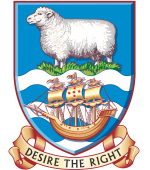About the Falkland Islands Constitution
In order to have a greater say in the running of the Falkland Islands the people of the Islands expressed a desire for a change in the Constitution. The first local Commission on the Constitution was set up by Legislative Council to ascertain exactly the Islander’s views and to submit recommendations. A report was published in 1975 which led to the changes of 1977. Two nominated members were replaced by two additional elected members giving the elected members a majority of the seats. Legislative Council now consisted of the Governor as President; the Chief Secretary and Financial Secretary as ex-officio members, and six elected members - one each for East Stanley, West Stanley, all of Stanley, East Falkland, West Falkland and all of Camp.
In 1981 a second Commission on the Constitution was set up by Legislative Council with extensive public consultation. This consultation gave rise to the Falklands Islands Constitution Order 1985 which took effect on 18 April 1985 and resulted in the ex-officio members of Legislative Council being unable to vote and eight elected members; four from the Camp constituency and four from the Stanley constituency.
In 1994 a Committee on the Constitution was established by Legislative Council to consider whether further changes should be made. As a result several significant amendments were made in 1997. To reflect the population movement in the Falkland Islands Camp members were reduced to three and Stanley members increased to five. Provision was made for an elected Speaker to replace the Governor as President of Legislative Council.
In 2000 a Select Committee on the Constitution was set up by Legislative Council in response to a UK White Paper in 1999 suggesting that all UK Overseas territories “should examine their Constitutions and constitutional relationships with the UK to ensure that they suited all the current day circumstances”.
In 2002 the Falkland Islands became a British Overseas Territory and the first Speaker was elected to replace the Governor in presiding over Legislative Council.
In 2005 the Report of the Select Committee was published for public comment and discussion.
On 1 January 2009 a new constitution took effect and the Legislative Council was renamed the Legislative Assembly.
The Constitution provides for:
CHAPTER I: PROTECTION OF FUNDAMENTAL RIGHTS AND FREEDOMS OF THE INDIVIDUAL
CHAPTER II: THE GOVERNOR
CHAPTER III: THE LEGISLATURE
CHAPTER IV: POWERS AND PROCEDURES OF THE LEGISLATIVE ASSEMBLY
CHAPTER V: THE EXECUTIVE
CHAPTER VI: FINANCE
CHAPTER VII: THE PUBLIC SERVICE
CHAPTER VIII: THE ADMINISTRATION OF JUSTICE
CHAPTER IX: COMPLAINTS COMMISSIONER
CHAPTER X: MISCELLANEOUS

